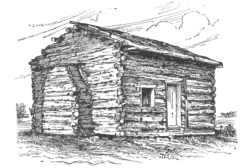LINCOLN 1074
Description
This page of the book is from "The New Student's Reference Work: Volume 2" by Chandler B. Beach, Frank Morton McMurry and others.
LINCOLN
1074
LINCOLN
He made two voyages on flatboats to New Orleans; served as captain of the Clary's Grove boys, a company of volunteers in the Black Hawk War; clerked in a store; acted as village postmaster, carrying all the mail in his hat; and learned surveying. As a trader he was a failure, but his moral, social and mental gifts made him a leader. In 1834 he was chosen by the Whigs of his district to represent them in the legislature. Self-educated, he passed the examination for admission to the bar in 1837. When Springfield became the capital of Illinois in 1839, he removed to that city, and in 1842 refused to serve further in the legislature. All his time was needed to attend to his growing practice. In 1846 he served one term in Congress, but the administration was Democratic and, as a Whig, there was little chance to distinguish himself. From 1848 to 1854 Lincoln was out of politics, but he
was making a great reputation at the bar and as an orator. The passage of the Kansas-Nebraska bill of Stephen A. Douglas, Democratic senator from Illinois, alarmed the Whigs of the north to vigorous resistance against the threatened spread of slavery. Lincoln soon became the leader of the opposition in the west. He returned to the Illinois legislature, and he helped organize the new Republican party. In the first national convention of the Re-
fiublicans his name was presented by the llinois delegation as its candidate for the vice-presidency. In 1858 his fame was given a national scope by the Lincoln-Douglas debates and fight for the United States senatorship. In his speech in the Republican state convention that summer he made an observation that set the nation to thinking: "A house divided against itself cannot stand. I believe this government cannot remain permanently half-slave and half-free."
In the seven public debates in various
arts of Illinois between Lincoln and •ouglas, Lincoln demoralized his opponent
who had been looked upon as probably the next president. Douglas was returned to the national senate by a lessened majority, and admissions hadi been forced from him that killed his popularity in the south and his chances for the presidency. In the election of i860 the Democratic vote was divided between Douglas and Breckinridge. But their united vote would not have defeated Lincoln, who had 180 votes in the electoral college against 123 for all other candidates.
Lincoln was not pledged to abolish slavery, only to preserve the Union and to prevent the spread of slavery. Even after the war began, the government offered to purchase the freedom of slaves in the slave-states that remained loyal—Kentucky, West Virginia and Missouri. But the secession movement began as soon as Lincoln's election in November, i860, was assured. When his inauguration took place on March 4, 1861, seven states had seceded. In his inaugural address he declared that the Federal government would not assail the rebellious states, but that it would "defend, protect and preserve if attacked." A month later Fort Sumter was bombarded and captured by the Confederate government. The president mobilized the regular army and issued a call for volunteers. Within a month all the states had arrayed themselves on one side or the other, and the four years' Civil War was begun. The conduct and results of this war are set forth in every school-history. Separate sketches of the commanders who distinguished themselves are to be found in this reference-work. (See Grant, Sherman, Farragut, Thomas and Lee.) Lincoln's part was to guide the ship of state through the troubled waters of civil war. For two years he kept-consistently to the task of preserving the Union. On Jan. 1, 1863, he issued the emancipation proclamation, and from that on the prosecution of the war had the added purpose of freeing the slave. Never has the world seen a greater example of wisdom, patience, patriotism and moral courage than animated his every act. The battle of Gettysburg was fought in July, 1863. In the following November the battlefield was dedicated as a national cemetery. Lincoln's brief speech on that occasion will ever remain one of the greatest speeches ever uttered, both for its lofty sentiment and for its matchless literary style :
Fourscore and seven years ago our fathers brought forth on this continent a new nation, conceived in liberty and dedicated to the proposition that all men are created equal. Now we are engaged in a civil war, testing whether that nation, or any nation so conceived and dedicated, canvlong endure. We have met on a great battlefield of that war. We are met to dedicate a portion of that field as the final resting place of the men who here gave their lives that that nation might live. It is altogether fitting and proper that we should do this.

THE CABIN IN WHICH LINCOLN WAS BORN


